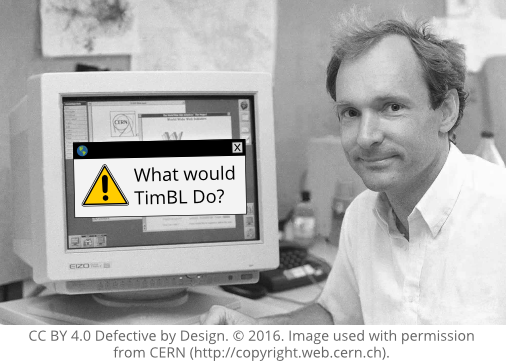 The chief arbiter of Web standards, Tim Berners-Lee, has an important choice to make this week. He must decide whether or not to allow media and technology companies to add socially harmful Digital Restrictions Management (DRM) into the technical capabilities of the Web, with a proposal called Encrypted Media Extensions (EME). The companies just announced on their public mailing list that they have requested Berners-Lee's seal of approval to move EME to the next phase of standardization: a Proposed Recommendation of the World Wide Web Consortium (W3C).
The chief arbiter of Web standards, Tim Berners-Lee, has an important choice to make this week. He must decide whether or not to allow media and technology companies to add socially harmful Digital Restrictions Management (DRM) into the technical capabilities of the Web, with a proposal called Encrypted Media Extensions (EME). The companies just announced on their public mailing list that they have requested Berners-Lee's seal of approval to move EME to the next phase of standardization: a Proposed Recommendation of the World Wide Web Consortium (W3C).
Twenty-five years ago, Berners-Lee invented the World Wide Web. Back then timbl -- as he's known online -- declined opportunities to lock down his creation and established himself as an advocate for a freedom-affirming, interoperable, and universally accessible World Wide Web. Now he's considering turning his back on this vision to make Netflix, Google, Apple, and Microsoft happy.
We have just days to convince Tim Berners-Lee to choose freedom for the Web and block Encrypted Media Extensions from becoming an official standard. Repeat our message on GNU social or Twitter¹, asking him a simple question: #WhatWouldTimblDo? Would the Web's once idealistic inventor really give up on free standards?
Not in to social media? You can also take action by sending in a selfie against DRM in Web standards or signing our petition.
Some background
Big media owners, like the movie studios represented by the MPAA and the music labels represented by the RIAA, feel threatened by the sharing that digital technology enables. Since the '90s, they've poured bottomless resources into locking down not just the Web but physical devices as well. One of their favorite tools is DRM -- digital handcuffs that limit what people can do with media.
These companies have never cared that DRM denies users the right to control their computers, or that it causes huge collateral damage by opening security holes, restricting cultural creativity, and limiting accessibility for the disabled. In fact, they've even had laws like the Digital Millenium Copyright Act passed, to give DRM special status that makes it illegal to circumvent. More recently, companies that stream media, like Netflix and Google, have forged distribution deals with media giants. These lucrative relationships are an incentive to join the labels in their quest for control.
In 2013 Berners-Lee surprised the world by allowing some of the companies that use DRM -- namely Netflix, Apple, Google, and Microsoft -- to start developing their latest project within the walls of the World Wide Web Consortium (W3C), the official Web standards organization led by Berners-Lee. Their project, EME, is a universal DRM system for the Web. The choice Berners-Lee faces now is whether or not to allow EME to reach the "maturity level" of a Proposed W3C Recommendation, indicating he feels it is ready to become an official standard and passing it to the W3C's Advisory Committee for ratification.
This is the first time that Berners-Lee and the W3C have considered including DRM in Web standards. Berners-Lee seems to be hoping that the big media companies will accept EME and use it to make DRM cheaper and easier for streaming video, then leave the free Web alone. But history shows us the exact opposite. DRM has to keep spreading to new platforms and formats to maintain control over users, and its owners have no reason not to use their massive power and money to continue integrating it into more elements of the Web. Indeed, there are murmurs about adding DRM to text and image standards, which would be energized by the ratification of EME. EME foreshadows a future Web that is riddled with DRM, where the freedom and transparency of the system (like viewing source HTML in a browser) will be gradually phased out.
We won't give up on the Web
Berners-Lee still has a chance to say no to EME and keep the W3C on the right side of history. There is a real possibility that he might -- he's recently weakened his support for EME. If he does reject it, he will be congratulated by the community of technologists that work in the public interest -- figures like security expert Bruce Schneier and MIT Media Lab director Joi Ito have been very clear that they want a Web without DRM, and more than 34,000 people sent the same message through petition signatures. All timbl has to do is remember his original vision for the Web, and block EME from moving forward through the W3C standards-setting process.
Head to GNU social or Twitter¹, and remind Tim Berners-Lee of his original vision for the Web.
¹: We recommend free software-based, decentralized microblogging services like GNU Social and Pump.io over Twitter (read more).